The Department of Justice (DOJ) announced on Nov. 5 that they have launched a new task force that will discover and prosecute companies engaging in anticompetitive behavior such as price-fixing and bid-rigging in government procurements, grants, and programs.
This comes months after five South Korean oil companies agreed to plead guilty to their involvement in a bid-rigging conspiracy that targeted contracts to supply fuel to U.S. military bases in South Korea. The companies agreed to pay a total of $156 million in criminal fines and over $205 million in separate civil settlements.




